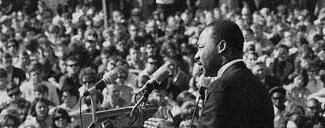The Hearts and Habits of Men: MLK on Law and Morality

UCLA recently made the audio available of a speech given by Rev. Dr. Martin Luther King Jr., just over a month after the march from Selma to Montgomery. King addresses a number of topics, including the debate surrounding the Voting Rights Act. You can listen to the whole thing here.
At one point in the speech, King stops to address a number of myths that are often heard and circulated, and one of these is of perennial interest, as it has to do with the interaction between positive law, morality, and culture.
We often hear, for instance, that law is downstream from culture, and this is true enough. Thus, King admits (starting at around the 33:35 mark) that there is some truth in this kind of view as far as it goes. But this does not mean that there is no place for legislation.
As King puts it:
It may be true that you can’t legislate integration, but you can legislate desegregation. It may be true that morality cannot be legislated, but behavior can be regulated. It may be true that the law cannot change the heart, but it can restrain the heartless. It may be true that the law can’t make a man love me, but it can restrain him from lynching me, and I think that’s pretty important also. So while the law may not change the hearts of men, it does change the habits of men. And when you change the habits of men, pretty soon the attitudes and the hearts will be changed. And so there is a need for strong legislation constantly to grapple with the problems we face.
The passage has significant import for how we view the task of reform, and whether and how we relate the various responsibilities attendant upon the legislator, the citizen, and the broader culture.
Conservatives often grasp at the “law is downstream from culture” formula as a way of de-emphasizing political action. In some cases, this de-emphasis may be necessary, but is important that such tactical decisions be made on a more stable and accurate foundational understanding of the interaction between morality and law.
As Ryan Anderson puts it:
The upstream/downstream metaphor can be misleading. Culture shapes law, but so too does law shape culture. The law both reflects our values and teaches values—especially to younger generations. The better metaphor, I think, is that of two coasts connected by a tide, that comes in and out, that picks up and drops off on the shorelines.
“Law and culture reinforce each other,” he continues, “either for or against human dignity and human flourishing.”
—
For more on the intersection of law and morality, see Episode 4: The Economy of Order.
This post was originally published at the Acton PowerBlog
Image credit: Minnesota Historical Society
- Log in to post comments
